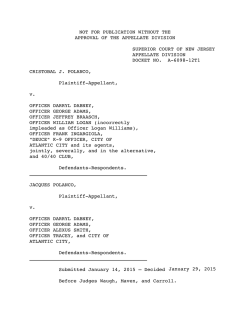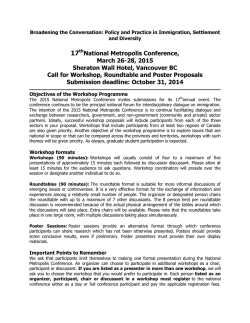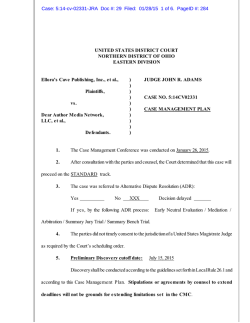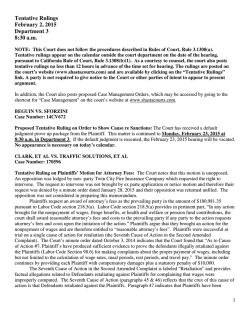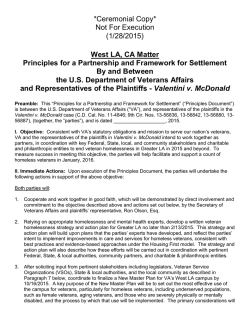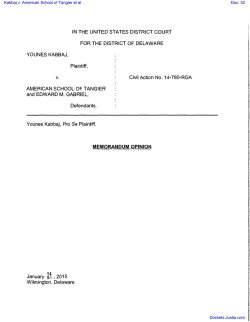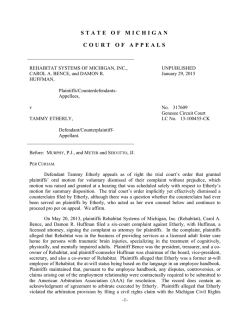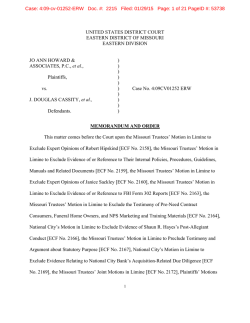
In re Harris Teeter Merger Litigation
STATE OF NORTH CAROLINA
IN THE GENERAL COURT OF JUSTICE
SUPERIOR COURT DIVISION
13 CVS 12579 (Master File);
13 CVS 13852;
13 CVS 14264
COUNTY OF MECKLENBURG
In re Harris Teeter Merger Litigation
{1}
)
)
)
)
ORDER AND FINAL JUDGMENT
THIS MATTER is before the Court on Plaintiffs’ Unopposed Motion for
Final Approval of Settlement (“Approval Motion”) and Plaintiffs’ Unopposed Motion
for Award of Attorneys’ Fees and Expenses and Plaintiff Incentive Awards, each
filed with supporting briefs on May 28, 2014, and arising from a settlement
stipulation conditionally entered on or about February 20, 2014, and subsequently
finalized subject to Court approval (the “Settlement”), implementing an earlier
tentative settlement subject to confirmatory discovery. Appropriate notice to
potential class members following the Court’s preliminary approval of the
Settlement was sent, and no objection to the Settlement has been made. The Court
held a final fairness hearing at which it examined Plaintiffs’ counsel, and the Court
is satisfied as to the fairness, reasonableness, and adequacy of the Settlement and
the fairness and reasonableness of the fees, costs, and incentives requested. The
Court now GRANTS each of the Motions, CERTIFIES the class as defined below for
purposes of the Settlement only, APPROVES the Settlement, AWARDS the
requested attorneys’ fees, costs, and incentives to class representatives, and
ENTERS FINAL JUDGMENT for the reasons more fully indicated below.
Wallace & Graham, P.A. by John Hughes and Mona Lisa Wallace; Cohen,
Placitella & Roth, P.C. by Stuart J. Guber and Jacob A. Goldberg; Wolf
Haldenstein Adler Freeman & Herz LLP by Gregory M. Nespole, Benjamin
Y. Kaufman, and Daniel Tepper for Plaintiff Westmoreland County
Employees Retirement Fund.
The Jackson Law Group, PLLC by Gary W. Jackson and Levi & Korsinky
LLP by Donald J. Enright and Elizabeth K. Tripoldi for Plaintiff Patricia
Gerlach.
Essex Richards, P.A. by Norris A. Adams, II and Marc E. Gustafson and The
Weiser Law Firm, P.C. by Joseph M. Profy and James M. Ficaro for Plaintiff
Tabitha Hamrick.
McGuireWoods LLP by Peter J. Covington, L. D. Simmons, II, Joshua D.
Davey, and R. Locke Beatty for Defendants John R. Belk, John P. Derham
Cato, Thomas W. Dickson, James E.S. Hynes, Anna Spangler Nelson, Mark
S. Ordan, Bailey W. Patrick, Robert H. Spilman, Jr., Harold C. Stowe, Isaiah
Tidwell, William C. Warden, Jr., and Harris Teeter Supermarkets, Inc.
Arnold & Porter LLP by Scott B. Schreiber and James W. Thomas, Jr., and
Parker Poe Adams & Bernstein LLP by Eric D. Welsh and Sarah Hutchins
for Defendants The Kroger Co. and Hornet Acquisition, Inc.
Gale, Judge.
I.
{2}
NATURE OF THE DISPUTE
Plaintiffs Priscilla Gerlach (“Gerlach”), Westmoreland County
Employees Retirement Fund (“Westmoreland”), and Tabitha Hamrick (“Hamrick”)
are former shareholders of Defendant Harris Teeter Supermarkets, Inc. (“Harris
Teeter”).
{3}
On July 8, 2013, Harris Teeter executed its Merger Agreement with
Defendant Hornet Acquisition, Inc., (“Hornet”), a wholly owned subsidiary of The
Kroger Co. (“Kroger”) formed for the purposes of the merger.
{4}
Harris Teeter announced the Merger Agreement on July 9, 2013. The
Merger Agreement grew out of a process that had begun at least as early as 2011.
After preliminary discussions regarding a potential acquisition, Harris Teeter
engaged J.P. Morgan Securities LLC (“J.P. Morgan”) as its financial advisor in
November, 2012. The media first reported that Harris Teeter was evaluating
strategic options on January 18, 2013, when the closing share price of Harris Teeter
was $36.94. The Merger Agreement provided for a share purchase value of $49.38,
yielding an overall merger valuation of $2.44 billion.
{5}
Gerlach was the first to file her Complaint challenging the merger on
July 16, 2013. Westmoreland filed its Complaint on August 1, 2013, and Hamrick
2
filed her Complaint on August 12, 2013. Each of the three actions was designated
as a mandatory complex business case and assigned to this Court. In addition to
the corporate Defendants, the actions were brought against the individual members
of Harris Teeter’s Board of Directors. The claims included breaches of duties of
care, good faith, loyalty, and candor; failures to disclose; self-dealing; failure to
secure adequate merger consideration; and agreeing to unreasonable dealprotection measures. Plaintiffs alleged that Kroger aided and abetted these
breaches and failures.
{6}
Harris Teeter filed its Preliminary Proxy Statement on August 2, 2013.
{7}
Gerlach amended her Complaint on August 20, 2013. The Amended
Complaint included an increased emphasis on alleged failures to disclose. These
alleged failures to disclose related to Harris Teeter’s having agreed to
confidentiality agreements with various potential suitors, including provisions now
commonly referred to as “don’t ask, don’t waive” agreements, and various factors
related to J.P. Morgan’s evaluation and fairness opinion.
{8}
The Court consolidated the three actions on August 29, 2013,
designating the Gerlach Amended Complaint as the operative pleading, and the
following day appointed the Plaintiffs’ lead counsel committee, comprised of
individuals and firms with extensive, well-documented experience and success in
this type of litigation. A substantially similar suit brought in the United States
District Court for the Western District of North Carolina was stayed in deference to
proceedings in this Court. See generally Krieger v. Harris Teeter Supermarkets,
Inc., No. 3:13CV00453, 2013 U.S. Dist. LEXIS 134113 (W.D.N.C. Sept. 18, 2013).
{9}
The claims in the Gerlach Amended Complaint were asserted on behalf
of a purported class of Harris Teeter common stockholders as of July 9, 2013,
exclusive of persons or entities closely associated with the corporations. The
Amended Complaint alternatively alleged direct and derivative claims. Plaintiffs
did not make a demand upon Harris Teeter before bringing their initial actions but
instead claimed that the initial Complaint was an adequate demand for purposes of
3
the Amended Complaint, and that making a demand upon Harris Teeter after the
initiation of litigation satisfied any statutory demand requirement.
{10}
Harris Teeter filed its Final Proxy on August 27, 2014.
{11}
Plaintiffs and Defendants both proceeded vigorously. The Harris
Teeter Defendants filed a Motion to Dismiss on September 9, 2013, and the Kroger
Defendants filed a Motion to Dismiss on September 10, 2013. These motions
challenged the claims on their merits, heavily emphasizing the business judgment
rule. Both Motions further asserted that the claims were derivative, and failed
because the demand requirement for a derivative action had not been met.
{12}
Plaintiffs undertook expedited document review and received an initial
set of documents by September 6, 2013. Plaintiffs, on September 18, 2013, filed a
Motion for Preliminary Injunction to enjoin the merger, which was scheduled for a
shareholder vote on October 3, 2013.
{13}
The Court ordered expedited briefing, setting the respective motions
for a consolidated hearing on September 30, 2013.
{14}
On September 24, 2013, the parties entered a Memorandum of
Understanding (“MOU”), resolving all claims, subject to confirmatory discovery.
The Settlement focused on Plaintiffs’ disclosure-based claims. Pursuant to the
MOU, Harris Teeter made supplemental disclosures by filing a Form 8-K on
September 24, 2013.
{15}
The shareholder vote was held as scheduled on October 3, 2013, at
which 40,818,430 shares voted in favor of the merger, 370,228 shares voted against,
and 204,960 shares abstained.
{16}
Plaintiffs conducted a confirmatory deposition of Harris Teeter’s lead
independent director on October 31, 2013.
{17}
Harris Teeter and Kroger received an early termination of the Hart-
Scott-Rodino waiting period and completed the merger on January 28, 2014.
{18}
The parties then executed a Stipulation and Agreement of
Compromise, Settlement and Release (“Stipulation”) on February 20, 2014.
4
Plaintiffs then filed their Unopposed Motion for Preliminary Approval on March 14,
2014.
{19}
The Court issued its Preliminary Approval Order on April 3, 2014,
preliminarily certifying the Settlement Class, directing that notice be given, and
setting a fairness hearing for June 17, 2014.
{20}
Initial notice was sent as directed. By consent, the fairness hearing
was continued until August 6, 2014, to allow additional notice to be sent.
{21}
Harris Teeter engaged Broadridge Financial Solutions, Inc.
(“Broadridge”) as an agent to undertake the mailing of notice of the Settlement as
directed by Court. As of July 30, 2014, Broadridge had mailed notice to a total of
16,442 recipients.
{22}
The Court held the fairness hearing on August 6, 2014. Neither the
Court, the parties, nor Broadside received any objection to the Settlement, either
before, during, or after the fairness hearing.
II.
{23}
CLASS CERTIFICATION
This Court has broad discretion in determining whether a case should
continue as a class action. Harrison v. Wal-Mart Stores, Inc., 170 N.C. App. 545,
547, 613 S.E.2d 322, 325 (2005) (citing Faulkenbury v. Teachers’ and State
Employees’ Ret. Sys. of N.C., 345 N.C. 683, 699, 483 S.E.2d 422, 432 (1997)). Class
certification is controlled by North Carolina Rule of Civil Procedure 23, as
interpreted by our courts. See N.C. R. Civ. P. 23.
Specifically, the Court, in its discretion, may certify a class action
where these requirements are met: “(1) the existence of a class, (2) . . .
the named representative will fairly and adequately represent the
interests of all class members, (3) . . . there is no conflict of interest
between the representative and class members, (4) . . . class members
outside the jurisdiction will be adequately represented, (5) . . . the
named party has a genuine personal interest in the outcome of the
litigation, (6) . . . class members are so numerous that it is impractical
to bring them all before the court, (7) . . . adequate notice of the class
action is given to class members.”
5
Ehrenhaus v. Baker, Order, No. 08 CVS 22632 ¶ 39 [Mecklenburg] (N.C. Super. Ct.
Feb. 5, 2010), http://www.ncbusinesscourt.net/TCDDotNetPublic/default.aspx?CID=
3&caseNumber=08CVS22632 (alterations in original) (quoting Perry v. Union
Camp Corp., 100 N.C. App. 168, 170, 394 S.E.2d 681, 682 (1990) (summarizing the
factors found in Crow v. Citicorp Acceptance Co., 319 N.C. 274, 282–84, 354 S.E.2d
459, 465–66 (1987))).
{24}
North Carolina courts hold that that “a class exists . . . when the
named and unnamed members each have an interest in either the same issue
of law or of fact, and that issue predominates over issues affecting only
individual class members.” Crow, 319 N.C. at 280, 354 S.E.2d at 464. Here,
the class representatives’ claims are typical of claims of the putative class,
are common to all former Harris Teeter shareholders, and predominate over
any potential individual claim, thereby satisfying the requirements for the
existence of a class established by Crow. See id.
{25}
The named class representatives fairly and adequately
represented the interests of all class members and were each shareholders
without any conflict with other members of the putative class. Class members
outside the jurisdiction were adequately represented. The named class
representatives had a clear stake and genuine personal interest in the
controversy, satisfying the requirements established by Crow. Id. at 282–83;
354 S.E.2d at 465.
{26}
The class consists of thousands of shareholders, easily meeting
the numerosity requirement that Crow established. Id. at 283, 354 S.E.2d at
466 (citing N.C. R. Civ. P. 23(a)).
{27}
Class members were given fair and adequate notice, thereby satisfying
the notice requirements for class certification found in Crow. Id. at 283–84, 354
S.E.2d 466.
{28}
Because all class action prerequisites have been met, the Court has the
discretion to then determine whether a class action is superior to other methods for
adjudication of this controversy. Blitz v. Agean, 743 S.E.2d 247, 249 (2013).
6
Plaintiffs ask the Court to certify a “non-opt-out” class. With respect to class
actions, “the term ‘opt-out’ refers to a class member’s ability to exclude himself from
a class actions settlement. By opting out, the class member avoids the preclusive
effect of the settlement.” Ehrenhaus v. Baker, 216 N.C. App. 59, 78, 717 S.E.2d 9,
23 (2011). Certifying a non-opt-out class in this action is the superior means of
resolving the claims in this action, particularly because Plaintiffs sought injunctive
relief, and because proceeding otherwise would allow for the potential of
inconsistent results in future litigation. See id. at 79, 717 S.E.2d at 23 (“When the
class representative seeks injunctive or declaratory relief, a non-opt-out class is
necessary ‘to avoid unnecessary inconsistencies and compromises in future
litigation.’” (quoting DeBoer v. Mellon Mortg. Co., 64 F.3d 1171 (8th Cir. 1995))).
This Court has previously approved a non-opt-out class in a corporate acquisition.
See In re PPDI Litig., 2012 NCBC LEXIS 31, at *3–4 (N.C. Super. Ct. May 24,
2012). Other judges of the North Carolina Business Court have certified non-optout settlement classes in merger litigation. See, e.g., In re Progress Energy S’holder
Litig., 2011 NCBC LEXIS 44 (N.C. Super. Ct. Nov. 29, 2011) (Jolly, J.); Ehrenhaus,
Order, No. 08 CVS 22632 ¶ 77 (Diaz, J.); In re Quintiles Transnational Corp.
S’holder Litig., 2003 NCBC LEXIS 3 (N.C. Super. Ct. Oct. 10, 2003) (Tennille, J.).
{29}
Accordingly, the Court certifies the following non-opt-out Settlement
Class solely for the purpose of effectuating the Settlement:
all record and beneficial holders of Harris Teeter common stock and
their respective successors, predecessors, representatives, trustees,
executors, administrators, heirs, assigns or transferees, immediate or
remote, and any person or entity acting for or on behalf of, or claiming
under any of them, together with their predecessors and successors
and assigns, who held Harris Teeter common stock at any time
between and including July 9, 2013 and January 28, 2014, (the date of
consummation of the Proposed Transaction), but excluding: (i) the
Defendants; (ii) the immediate families of the Harris Teeter Board; (iii)
any parent, subsidiary, affiliate, officer, or director of Harris Teeter;
and (iv) any entity in which any excluded person has a controlling
interest.
7
III.
{30}
THE SETTLEMENT
The Court now examines the fairness, adequacy and reasonableness of
the Settlement. Ehrenhaus, 216 N.C. App. at 73, 717 S.E.2d at 20. The burden of
proving these factors is on the Plaintiffs. Id. For reasons discussed below, the
Court concludes that Plaintiffs have satisfied their burden.
{31}
The Court concludes that the consideration for the Settlement was fair,
reasonable, and adequate. In so concluding, the Court compared the supplemental
disclosures with the nature and strength of claims and defenses.
{32}
Perhaps the strongest indication of the reasonableness of the
Settlement is the response of class members who overwhelmingly approved the
merger and who raised no objection to the Settlement after having received notice of
it. Ehrenhaus, 216 N.C. App. at 74, 717 S.E.2d at 20 (“[T]he reaction of the class to
the settlement is perhaps the most significant factor to be weighed in considering
its adequacy.” (alteration in original) (quoting Sala v. Nat’l R.R. Passenger Corp.,
721 F.Supp. 80, 83 (E.D. Pa. 1989)).
{33}
Plaintiffs’ claims include both direct claims and derivative claims. The
claims also include a mix of claims for a failure to disclose and claims related to
other breaches of fiduciary duties owed by the directors. Ultimately, Plaintiffs’
counsel determined that a settlement that achieved supplemental disclosures
without further monetary relief was in the best interests of the putative class
because the disclosures were material to the upcoming shareholder vote and Harris
Teeter would only agree to make the additional disclosures as a part of a
comprehensive settlement of all claims.
{34}
The Settlement resulted from arm’s-length negotiations undertaken
without collusion. Prior to entering the MOU, Plaintiffs obtained and reviewed
approximately 92,000 pages of documents, particularly regarding the method by
which Harris Teeter approved the merger after receiving financial advice from J.P.
Morgan.
{35}
Prior to entering the MOU, Plaintiffs’ counsel reanalyzed their claims,
taking into account their review of documents produced in discovery, and
8
determined that the potential for success on claims of breaches of duty other than
the duty to disclose was not sufficient to forego the opportunity to secure
supplemental disclosures before the shareholder vote.
{36}
Plaintiffs’ counsel were well equipped to undertake this analysis, as
they are substantially experienced in comparable litigation in both North Carolina
and before the Delaware Chancery Court. “[T]he opinion of experienced and
informed counsel is entitled to considerable weight,” Ehrenhaus, 216 N.C. App. at
93, 717 S.E.2d at 31 (alteration in original) (quoting In re Am. Bank Note
Holographics, Inc., 127 F.Supp. 2d 418, 430 (S.D.N.Y. 2001), where counsel has
undertaken a “detailed assessment[] of the strength and weaknesses of the claims
asserted, the applicable damages, and the likelihood of recovery.” In re Am. Bank
Note Holographics, Inc., 127 F.Supp. 2d at 430.
{37}
To pursue claims for breaches of fiduciary duty other than the duty to
disclose, Plaintiffs faced two potentially insurmountable hurdles. First, Defendants
presented a strong defense, asserting that such claims are solely derivative, and
therefore no individual shareholder has standing to bring those claims directly.
See, e.g., Barger v. McCoy Hillard & Parks, 346 N.C. 650, 659, 488 S.E.2d 215, 220
(1997) (“[P]laintiffs must allege facts from which it may be inferred that defendants
owed plaintiffs a special duty. . . . To support the right to an individual lawsuit, the
duty must be one that the alleged wrongdoer owed directly to the shareholder as an
individual.”); Fulton v. Talbert, 255 N.C. 183, 120 S.E.2d 410 (1961); Jordan v.
Hartness, 230 N.C. 718, 55 S.E.2d 484 (1949). Second, Plaintiffs would have to
overcome the presumptions afforded by the business judgment rule. In re Hickory
Printing Grp., 469 B.R. 623, 626–27 (W.D.N.C. 2012).
{38}
The complaints purporting to bring derivative claims were filed before
any written demand was made on Harris Teeter. In North Carolina, such a written
demand is a condition precedent to a derivative action. N.C. Gen. Stat. § 55-7-42(1)
(2013); see also Norman v. Nash Johnson & Sons’ Farms, Inc., 140 N.C. App. 390,
396, 537 S.E.2d 248, 253 (2000). North Carolina does not recognize a futility
exception to this requirement, and the failure to make demand is fatal. See Allen v.
9
Ferrera, 141 N.C. App. 284, 289, 540 S.E.2d 761, 765 (2000); see also In re
Wachovia S’holders Litig., 2004 NCBC LEXIS 1, at *30 (N.C. Super. Ct. Dec. 19,
2003) rev’d on other grounds, 168 N.C. App. 135, 607 S.E.2d 48 (2005); Russell M.
Robinson, II, Robinson on North Carolina Corporation Law § 17.03[2] (7th ed.
2013).
{39}
Plaintiffs did not cure this potentially fatal defect when they filed their
Amended Complaint. This Court has earlier rejected the notion that an original
complaint should be deemed an adequate demand for a subsequent amended
complaint, indicating that the more proper procedure is to make a demand upon the
corporation, then follow with a complaint and a request that the Court excuse the
statutory waiting period. Greene v. Shoemaker, 1998 NCBC LEXIS 4, at *11 (N.C.
Super. Ct. Sept. 24, 1998) (“To hold that the filing of a complaint, which was itself
subject to dismissal for failure to meet the demand requirement, can satisfy the
demand requirement for a second complaint would defeat the purpose of the
statute.”). Plaintiffs did not follow that procedure.
{40}
Even assuming that this procedural defect was not fatal, Plaintiffs still
faced considerable uncertainty as to whether their challenges to director action
could overcome the evidentiary presumption afforded by the business judgment
rule. Hammonds v. Lumbee River Elec. Membership Corp., 178 N.C. App. 1, 20–21,
631 S.E.2d 1, 13–14 (2006). Notably, North Carolina’s Business Corporation Act
rejects the notion that a potential change in control creates separate director duties.
N.C. Gen. Stat. § 55-8-30(d) (2013); see Robinson, supra, at § 9.08[3].
{41}
Plaintiffs’ chances of success were not significantly strengthened by
adding an aiding and abetting claim against Kroger. This Court has earlier noted
the uncertainty of whether North Carolina recognizes a claim of aiding and abetting
a breach of fiduciary duty, and that even if it does, the claim obviously depends on
proof of the underlying breach of fiduciary duty. See Tong v. Dunn, 2012 NCBC
LEXIS 16, at 11–13 (N.C. Super. Ct. Mar. 9, 2012).
{42}
In sum, the Court determines that Plaintiffs’ counsel reasonably
concluded that the best interests of the Settlement Class were to pursue a
10
settlement based on their claims for supplemental disclosures without further
monetary recovery based on other claims.
{43}
Plaintiffs’ disclosure claims may have survived Defendants’ Motions to
Dismiss as direct, rather than derivative actions. While not discussing specifically
whether a claim based on a director’s duty to disclose is direct or derivative, the
Court of Appeals of North Carolina stated, “We find the Delaware courts’
articulation of the nondisclosure principal persuasive. We hold that North Carolina
directors ‘are under a fiduciary duty to disclose fully and fairly all material
information within the board’s control when it seeks shareholder action.’”
Ehrenhaus, 216 N.C. App. at 88, 717 S.E.2d at 29 (quoting Stroud v. Grace, 606
A.2d 75, 84 (Del. 1992)). Without deciding the issue, the Court believes it likely
that North Carolina appellate courts would hold that a shareholder may present a
direct claim for a director’s failure to disclose material information when seeking
affirmative shareholder action.
{44}
Having elected to concentrate on disclosure claims, Plaintiffs’ counsel
was required to assess the strength of those claims in considering whether the
bargained-for supplemental disclosures were adequate consideration for the
Settlement. Plaintiffs’ counsel undertook a comprehensive analysis of each of the
supplemental disclosures made by the Form 10-K filing, but the three most
significant disclosures were those related to (1) the confidentiality and standstill
agreements utilized in the negotiation process; (2) the manner in which J.P. Morgan
solicited interest from potential bidders; and (3) J.P. Morgan’s financial projections.
While supporting the Settlement, Defendants challenge whether the disclosures
were necessary or material. The Court need not side with either party, as it
concludes that the dispute between them is an adequate basis to conclude that
settlement was fair, reasonable, and adequate.
{45}
In Ehrenhaus, the court of appeals adopted the Delaware Supreme
Court’s articulation of “materiality,” used while evaluating director disclosures, to
the effect that a disclosed fact is material if there is a “substantial likelihood that
the disclosure of the omitted fact would have been viewed by the reasonable
11
investor as having significantly altered the ‘total mix’ of information made
available.” Ehrenhaus, 216 N.C. App. at 88, 717 S.Ed.2d at 28–29 (quoting
Rosenblatt v. Getty Oil Co., 493 A.2d 929, 944 (Del. 1985)).
{46}
As to the supplemental disclosures regarding the confidentiality
agreements that Harris Teeter entered into with potential bidders, the initial
Proxy Statement identified these agreements, but the Form 8-K filing provided
further details regarding the agreements and the manner in which the “don’t ask,
don’t waive” provisions operated. The Delaware Chancery Court has recognized the
potential materiality of such information, at least for certain transactions. See In re
Ancestry.com Inc. S’holder Litig., C.A. No. 7988-CS, 2012 Del. Ch. LEXIS 294 (Dec.
17, 2012) (TRANSCRIPT).
{47}
With regard to supplemental disclosures regarding J.P. Morgan’s sale
process, the Court recognizes that an understanding of that process may be
material in the total mix of information, but that a board of directors need not
necessarily include a “blow-by-blow” description of the sales process. See Dent v.
Ramtron Int’l Corp., 2014 Del. Ch. LEXIS 110, *45–46 (June 30, 2014) (citing
Matador Capital Mgmt. Corp. v. BRC Hldgs., Inc., 729 A.2d 280, 295 (Del. Ch.
1998).
{48}
As to supplemental disclosures of J.P. Morgan’s underlying financial
projections, Plaintiffs concentrated most significantly on projections of Harris
Teeter’s unlevered, after-tax free cash flow, citing In re Bioclinica, Inc. Shareholder
Litigation, No. 8272-VCG, 2013 Del. Ch. LEXIS 52, at *18–21 (Feb. 25, 2013)
(finding that the fact that management did not disclose certain financial projections
was itself material). In response, Defendants note that the Delaware courts do not
enforce a per se duty to disclose each of the financial projections upon which the
financial advisor relied, so long as the total mix of information disclosed to
shareholders is adequate. Dent, 2014 Del. Ch. LEXIS 52, at *28.
{49}
In sum, the Court concludes that the parties each had support for their
respective arguments and that the Settlement reflects a reasoned compromise. The
supplemental disclosures unaccompanied by additional monetary relief were fair,
12
reasonable, and adequate consideration for the Settlement. The Settlement was in
the best interests of the Settlement Class.
IV.
{50}
THE REQUEST FOR ATTORNEYS’ FEES
Plaintiffs request that the Court approve the settlement provision
whereby Defendants agreed to pay up to $325,000 (“Settlement Payment”) to
reimburse Plaintiffs’ costs, make incentive awards to class representatives of
$2,500, and pay attorneys’ fees.
{51}
The Settlement is not conditioned on the Court approving the
Settlement Payment. If otherwise approved by the Court, the Settlement becomes
final whether or not the Settlement Payment is made.
{52}
As explained at the fairness hearing, the Court must consider two
related but separate issues: (1) whether the Court has the authority to grant the
request; and (2) if so, whether the requested Settlement Payment is reasonable.
Here, the first issue is more difficult than the second.
{53}
It is significant whether fees are sought for pursuing direct claims or
derivative claims. See generally In re Wachovia S’holders Litig., 168 N.C. App. 135,
607 S.E.2d 48 (2005) (reversing an award of attorneys’ fees under the common
benefit doctrine). A court has statutory authority to award attorneys’ fees for a
successful derivative claimant. But here, Plaintiffs did not comply with the demand
requirement for pursuing a derivative claim. There is no similar statutory
authority for awarding fees for the direct class claims of the type asserted here.
North Carolina recognizes the common fund doctrine but does not employ the
common benefit doctrine to award fees where a settlement creates no common fund
from which fees can be paid. Ehrenhaus, 216 N.C. App. at 94–95, 98, 717 S.E.2d at
32–33, 36.
{54}
Plaintiffs’ counsel asserts that the Court, when approving the
settlement, is not awarding attorneys’ fees but is simply upholding the parties’
contract, suggesting that Ehrenhaus endorsed such agreements. In Ehrenhaus, the
class entered a settlement providing for fees up to a certain amount, “subject to
13
court approval of the Settlement.” Id. at 95, 717 S.E.2d at 33. The court of appeals
“read the procedure as adopted by the trial court as the functional equivalent of
requiring the court to make an award of attorney’s fees.” Id. at 96, 717 S.E.2d at 33.
The court cautioned that, although a trial court has the authority to review and
approve a class settlement, the trial court does not have authority to “modify a
purely contractual settlement.” Id. The court did not then further address the
question of whether a contract between the parties for payment of fees can survive
under the limitations of Stillwell Enterprises v. Interstate Equipment. Co., 300 N.C.
286, 289, 266 S.E.2d 812, 814–15 (1980), which held that attorneys’ fees cannot be
recovered either as costs or damages, absent statutory authority. See generally
Ehrenhaus, 216 N.C. App 59, 717 S.E.2d 9. On remand, Judge Murphy authorized
the fee award, reading Stillwell to apply only to recovery of fees by a “prevailing
party,” whereas in a settlement agreement neither party “prevails.” Ehrenhaus v.
Baker, Order, No. 08 CVS 22632 ¶ 13 (N.C. Super. Ct. Mar. 25, 2014). That
premise has not yet been presented to the appellate courts.
{55}
This Court has, in another context, considered whether a court may
uphold an agreement between parties that allows for the recovery of attorneys’ fees
when there is no statutory authority for the payment of fees. See generally GR&S
Atl. Beach, LLC v. Hull, 2011 NCBC LEXIS 37 (N.C. Super. Ct. Sept. 29, 2011).
The Court noted that North Carolina appellate courts strictly adhere to a rule that
a successful litigant cannot recover attorneys’ fees as either costs or damages unless
there is clear statutory authority for the recovery. Id. at *15.
{56}
A North Carolina statute now allows certain reciprocal agreements in
commercial contracts to allow for the recovery of attorneys’ fees. N.C. Gen. Stat. §
6-21.6 (2013). However, the agreement in this case does not fall within that
statute’s purview, and the Court has been unable to discern any further specific
statutory authority upon which the claim of fees may rest.
{57}
Notwithstanding these questions, the Court also recognizes that the
court of appeals in Ehrenhaus did not reject the award of fees to class counsel before
remanding the issue of fees for further consideration in light of Rule 1.5 of the
14
Revised Rules of Professional Conduct of the North Carolina State Bar. Ehrenhaus,
216 N.C. App. at 96, 717 S.E.2d at 33; see also N.C. Rules of Prof’l Conduct Rule 1.5
(2003). The Court then proceeds by assuming its authority to authorize a private
agreement for payment of fees to class counsel as settlement consideration subject
to Court approval, and reviewing the reasonableness of the amount requested
utilizing the method suggested by Ehrenhaus.
{58}
Rule 1.5 includes the following factors:
(1) the time and labor required, the novelty and difficulty of the
questions involved, and the skill requisite to perform the legal service
properly;
(2) the likelihood, if apparent to the client, that the acceptance of the
particular employment will preclude other employment by the
lawyer;
(3) the fee customarily charged in the locality for similar legal services;
(4) the amount involved and the results obtained;
(5) the time limitations imposed by the client or by the circumstances;
(6) the nature and length of the professional relationship with the client
(7) the experience, reputation, and ability of the lawyer or lawyers
performing the services; and
(8) whether the fee is fixed or contingent.
Id.
{59}
Considering these factors, the provisions for attorneys’ fees, costs, and
incentive payments is fair and reasonable, and the fee sought is not excessive.
{60}
Plaintiffs’ counsel devoted 917.20 hours to the prosecution of the claim,
not including appearances at the fairness hearing. Plaintiffs’ counsel quickly
reached agreement on a lead counsel committee, avoiding unnecessary duplication
of effort. The nature of the claims required highly skilled litigation counsel that
was experienced in shareholder class actions. The lead counsel committee included
members who have appeared in similar cases in North Carolina and before the
Delaware Chancery Court, the latter of which has issued many influential or
precedential decisions.
{61}
Counsel’s time was efficiently and necessarily spent. Counsel retained
an experienced expert, reviewed and analyzed approximately 92,000 documents,
15
prepared a motion for preliminary injunction with supporting briefs, and undertook
confirmatory discovery after entering the MOU.
{62}
In support of their request for fees, Plaintiffs offer the affidavit of John
Hughes, indicating that North Carolina attorneys in complex commercial litigation
cases typically charge fees in the range of $250–$450 per hour. The Court’s
experience in other cases is that their request for fees fell within a reasonable
range. Consistent with GE Betz, Inc. v. Conrad¸ the Court here examined the fees
under North Carolina standards. See ___ N.C. App ___, 752 S.E.2d 634, 656–57
(2013). Fees for similar work in New York and Washington, D.C. certainly exceed
this range.
{63}
After deducting expenses and incentive awards, the requested
$325,000 Settlement Payment would yield net attorneys’ fees of $295,260.71, which
represents an average of $321.91 per hour. The Court concludes that this is
reasonable, and clearly is not an excessive rate.
{64}
The Court is advised that each of Plaintiffs’ counsel has a written
client fee agreement that includes an understanding of, and agreement to, the
sharing of fees among members of the lead counsel committee.
{65}
The requested fees reflect an appropriate recognition of the value of
the dispute and the results obtained.
{66}
Plaintiffs’ counsel undertook the representation with no assurance of
payment. They advanced the expenses of the litigation. They worked diligently
under a compressed time schedule.
{67}
Judge Jolly of this Court approved the payment of $550,000 in a
disclosure-based settlement. In re Progress Energy S’holder Litig., 2011 NCBC
LEXIS 45. Judge Murphy recently approved payment of $1,056,067.57 in fees to
counsel for the Ehrenhaus class. See Ehrenhaus, Order, No. 08 CVS 22632 (Feb. 5,
2010). This Court approved the payment of $450,000.00 in fees in In re PPDI
Litigation, 2012 NCBC LEXIS 33.
{68}
The Court has reviewed Vice Chancellor Laster’s chart of fees that
have been approved in Delaware litigation and finds that the requested Settlement
16
Payment is well within the parameters of what Delaware would award. In re
Sauer-Danfoss Inc. S’holders Litig., 65 A.3d 1116, 1141–43 apps. A–C (Del. Ch.
2011).
{69}
The incentive award of $2500 per plaintiff is fair and reasonable.
V.
JUDGMENT
NOW, THEREFORE, IT IS HEREBY ORDERED, ADJUDGED, AND
DECREED THAT:
{70}
The Consolidated Action is a proper class action pursuant to Rule 23 of
the North Carolina Rules of Civil Procedure.
{71}
Solely for the purposes of effectuating the settlement, the Court
certifies the Settlement Class consisting of
all record and beneficial holders of Harris Teeter common stock and their
respective successors, predecessors, representatives, trustees, executors,
administrators, heirs, assigns or transferees, immediate or remote, and any
person or entity acting for or on behalf of, or claiming under any of them,
together with their predecessors and successors and assigns, who held Harris
Teeter common stock at any time between and including July 9, 2013 and
January 28, 2014, (the date of consummation of the Proposed Transaction),
but excluding: (i) the Defendants; (ii) the immediate families of the Harris
Teeter Board; (iii) any parent, subsidiary, affiliate, officer, or director of
Harris Teeter; and (iv) any entity in which any excluded person has a
controlling interest.
{72}
All class members are bound by this Order and Final Judgment
(“Judgment”).
{73}
The parties to the Stipulation are hereby authorized and directed to
consummate the Settlement in accordance with the terms and provisions thereof,
and the Clerk is directed to enter and docket this Judgment.
{74}
This Consolidated Action and the Released Claims, as defined by the
Settlement Agreement, are hereby dismissed on the merits and with prejudice in
full and final discharge of any and all claims or obligations that were or could have
been asserted in the Consolidated Action against the Defendants.
17
{75}
Plaintiffs and all class members, and their respective heirs, executors,
administrators, estates, predecessors-in-interest, predecessors, successors-ininterest, successors, and assigns, agree to release and forever discharge, and by
operation of this Judgment hereby release and forever discharge, all Released
Claims as against all Released Persons, as defined by the Settlement Agreement.
The Released Persons shall be deemed to be released and forever discharged from
all of the Released Claims.
{76}
Plaintiffs and all class members, and their respective heirs, executors,
administrators, estates, predecessors-in-interest, predecessors, successors-ininterest, successors, and assigns, are forever barred and enjoined from commencing,
instituting, or prosecuting, either directly or in any other capacity, any Released
Claims against any of the Released Persons in any forum whatsoever.
{77}
Defendants and the Released Persons have agreed to release and
forever discharge, and by operation of this Judgment hereby forever release and
discharge, and are barred from asserting as against the Plaintiffs and Plaintiffs’
counsel, all claims, complaints, allegations or sanctions arising out of, relating to, or
in connection with, the institution, prosecution, assertion, settlement, or resolution
of the Consolidated Action or the Released Claims; provided, however, that this
shall not include any claims to enforce the Settlement.
{78}
Neither the MOU, the Stipulation or this Judgment, nor any of the
terms and provisions of the MOU, the Stipulation or this Judgment, nor any of the
negotiations or proceedings in connection therewith, nor any of the documents or
statements referred to herein, nor the Settlement, nor the fact of the Settlement,
nor the settlement proceedings, nor any statements in connection therewith, shall
(1) be deemed an admission by any Defendant of any fault, liability or wrongdoing
as to any facts or claims alleged or asserted in the Consolidated Action, or any other
actions or proceedings, or that any of the Supplemental Disclosures are material; (2)
be deemed an admission by any Plaintiff concerning the merits, or lack thereof, of
any facts or claims alleged or asserted in the Consolidated Action, or any other
actions or proceedings, or that any of the Supplemental Disclosures are not
18
material; or (3) otherwise be interpreted, construed, deemed, invoked, offered, or
received in evidence or otherwise used by any person in the Consolidated Action, or
in any other action or proceeding, whether civil, criminal, or administrative, except
in connection with any proceeding to enforce the terms of the Settlement or to
effectuate the liability protections agreed to herein, including without limitation to
enforce a defense or counterclaim based on principles of release, accord, and
satisfaction, good-faith settlement, res judicata, collateral estoppel, judgment bar or
reduction, claim or issue preclusion, or any similar liability-limiting defense.
{79}
If the Effective Date, as defined by the Settlement Agreement, does not
occur, if the Stipulation is disapproved, canceled, or terminated pursuant to its
terms, or if the Defendants withdraw from the Settlement pursuant to paragraph
8(a) of the Stipulation, all of the parties to the Stipulation shall be deemed to have
reverted to their respective litigation status immediately prior to the execution of
the MOU, and each Party shall be entitled to proceed as if the MOU and the
Stipulation had not been executed (except for paragraphs 2(b), 8(a), 8(b), 9(d)–(g),
9(i)–(m), 9(s), and 9(t) of the Stipulation, which shall survive the occurrence of any
such event) and the related orders had not been entered, and in that event all of
their respective claims and defenses as to any issue in the Consolidated Action shall
be preserved without prejudice in any way whatsoever.
{80}
The binding effect of this Judgment and the obligations of Plaintiffs
and Defendants under the Settlement shall not be conditioned upon or subject to
the resolution of any appeal from this Judgment that relates solely to the issue of
Class Counsel’s (or any other counsel’s) application for an award of attorneys’ fees
and expenses.
{81}
All class members shall be and are deemed bound by the Stipulation
and this Judgment. This Judgment, including the release of all Released Claims
against all Released Persons, shall have res judicata and other preclusive effect in
all pending and future lawsuits, arbitrations, or other proceedings maintained by or
on behalf of any of the Plaintiffs and all other class members as well as their
respective heirs, executors, administrators, estates, predecessors-in-interest,
19
predecessors, successors-in-interest, successors, and assigns, and anyone claiming
through or on behalf of any of them.
{82}
Without further order of this Court, the parties may agree in writing to
reasonable extensions of time to carry out any of the provisions of the Stipulation.
{83}
Without affecting the finality of this Judgment in any way, this Court
reserves jurisdiction over all matters relating to the administration and
consummation of the Settlement.
{84}
Defendants shall deliver to Plaintiffs’ counsel the Settlement
Payment of $325,000 within ten (10) business days after the date of this Order.
Such payment shall be subject to the joint and several obligation of Plaintiffs’
Counsel to refund, within ten (10) business days, any overage received and any
interest accrued or accumulated thereon if, as a result of any appeal or successful
collateral proceeding, the fee or expense award is reduced or reversed or if the
award order does not become final, the Settlement itself is voided by any Party as
provided herein or in the Stipulation, or the Settlement is later reversed by any
court. By making the payment called for in this paragraph, Defendants fully and
finally extinguish their liability for any and all attorneys’ fees, expenses, or other
costs in connection with the Consolidated Action, the class members, and any
counsel for members of the Settlement Class. Defendants shall bear no
responsibility or liability whatsoever for the allocation of any award of fees and
expenses.
{85}
Plaintiffs’ counsel shall pay the sum of $2,500 each to Westmoreland
County Employees’ Retirement Fund and Priscilla Gerlach as incentive awards
reflecting their effort and cooperation as class representatives.
IT IS SO ORDERED this 24th day of September, 2014.
_/s/ James L. Gale__________________
James L. Gale
Special Superior Court Judge
for Complex Business Cases
20
© Copyright 2026
